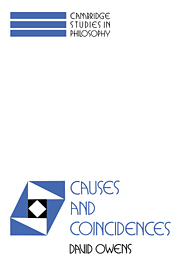Book contents
- Frontmatter
- Contents
- Preface
- Introduction
- 1 THE INEXPLICABILITY OF A COINCIDENCE
- 2 CAUSES AND LAWS
- 3 EVENTS AND NON–CAUSAL EXPLANATIONS
- 4 CAUSAL EXPLANATION
- 5 THE DIRECTION OF CAUSAL EXPLANATION
- 6 LEVELS OF CAUSATION
- 7 DEVIANT CAUSAL CHAINS
- 8 CAUSATION IN ACTION
- Conclusion: WHITHER CAUSAL REALISM?
- Bibliography
- Index
1 - THE INEXPLICABILITY OF A COINCIDENCE
Published online by Cambridge University Press: 14 October 2009
- Frontmatter
- Contents
- Preface
- Introduction
- 1 THE INEXPLICABILITY OF A COINCIDENCE
- 2 CAUSES AND LAWS
- 3 EVENTS AND NON–CAUSAL EXPLANATIONS
- 4 CAUSAL EXPLANATION
- 5 THE DIRECTION OF CAUSAL EXPLANATION
- 6 LEVELS OF CAUSATION
- 7 DEVIANT CAUSAL CHAINS
- 8 CAUSATION IN ACTION
- Conclusion: WHITHER CAUSAL REALISM?
- Bibliography
- Index
Summary
WHAT IS A COINCIDENCE
As I write, it rains outside. It has been raining all week. Tomorrow is my wedding day and I crave fine weather, but the forecasters give me little grounds for hope. In desperation I pray for fine weather and, sure enough, tomorrow dawns clear and bright. Those sceptical of the power of prayer will dismiss this as a coincidence, while many of the faithful will insist it was no coincidence. I shall not attempt to adjudicate this dispute. My aim is to discover exactly what is at stake here: what is it for an event to be a coincidence?
The sceptics will enlarge on their interpretation of events as follows: ‘your prayer's being answered is an event which is composed of two other events – (a) your praying for fine weather (b) your getting fine weather. The meteorological processes which brought about the fine weather were quite independent of those which brought about your prayer, therefore it was a coincidence that your prayer was answered.’
The faithful will reply as follows: ‘we agree that your prayer's being answered is an event with two components, but we refuse to believe that these components are independent of one another. Either your prayer caused the weather to be fine because God heard your request and granted it, or else your prayer and the state of the weather had a common cause in God who set up the world at the beginning of time so that your praying one day would be followed by fine weather the next.’
It should now be clear what is at issue.
- Type
- Chapter
- Information
- Causes and Coincidences , pp. 6 - 22Publisher: Cambridge University PressPrint publication year: 1992

